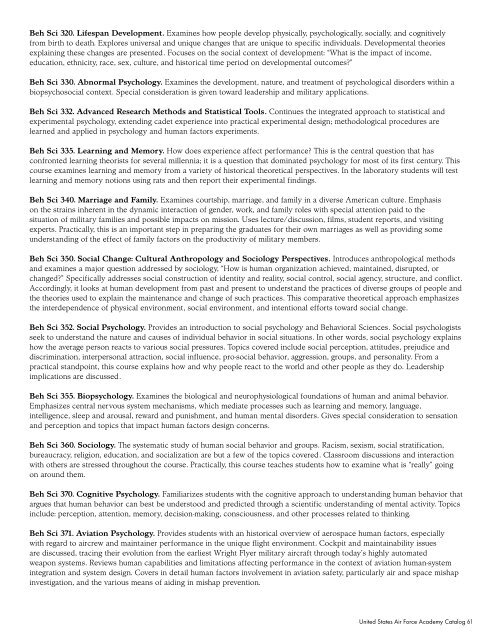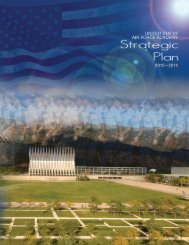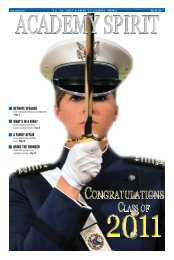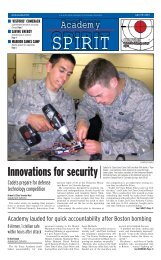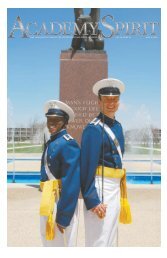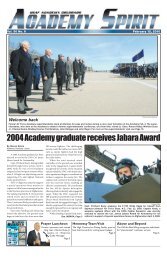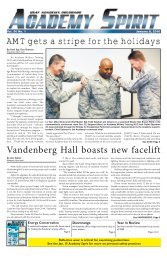2008-2009 Catalog - United States Air Force Academy
2008-2009 Catalog - United States Air Force Academy
2008-2009 Catalog - United States Air Force Academy
Create successful ePaper yourself
Turn your PDF publications into a flip-book with our unique Google optimized e-Paper software.
Beh Sci 320. Lifespan Development. Examines how people develop physically, psychologically, socially, and cognitively<br />
from birth to death. Explores universal and unique changes that are unique to specific individuals. Developmental theories<br />
explaining these changes are presented. Focuses on the social context of development: “What is the impact of income,<br />
education, ethnicity, race, sex, culture, and historical time period on developmental outcomes?”<br />
Beh Sci 330. Abnormal Psychology. Examines the development, nature, and treatment of psychological disorders within a<br />
biopsychosocial context. Special consideration is given toward leadership and military applications.<br />
Beh Sci 332. Advanced Research Methods and Statistical Tools. Continues the integrated approach to statistical and<br />
experimental psychology, extending cadet experience into practical experimental design; methodological procedures are<br />
learned and applied in psychology and human factors experiments.<br />
Beh Sci 335. Learning and Memory. How does experience affect performance? This is the central question that has<br />
confronted learning theorists for several millennia; it is a question that dominated psychology for most of its first century. This<br />
course examines learning and memory from a variety of historical theoretical perspectives. In the laboratory students will test<br />
learning and memory notions using rats and then report their experimental findings.<br />
Beh Sci 340. Marriage and Family. Examines courtship, marriage, and family in a diverse American culture. Emphasis<br />
on the strains inherent in the dynamic interaction of gender, work, and family roles with special attention paid to the<br />
situation of military families and possible impacts on mission. Uses lecture/discussion, films, student reports, and visiting<br />
experts. Practically, this is an important step in preparing the graduates for their own marriages as well as providing some<br />
understanding of the effect of family factors on the productivity of military members.<br />
Beh Sci 350. Social Change: Cultural Anthropology and Sociology Perspectives. Introduces anthropological methods<br />
and examines a major question addressed by sociology, “How is human organization achieved, maintained, disrupted, or<br />
changed?” Specifically addresses social construction of identity and reality, social control, social agency, structure, and conflict.<br />
Accordingly, it looks at human development from past and present to understand the practices of diverse groups of people and<br />
the theories used to explain the maintenance and change of such practices. This comparative theoretical approach emphasizes<br />
the interdependence of physical environment, social environment, and intentional efforts toward social change.<br />
Beh Sci 352. Social Psychology. Provides an introduction to social psychology and Behavioral Sciences. Social psychologists<br />
seek to understand the nature and causes of individual behavior in social situations. In other words, social psychology explains<br />
how the average person reacts to various social pressures. Topics covered include social perception, attitudes, prejudice and<br />
discrimination, interpersonal attraction, social influence, pro-social behavior, aggression, groups, and personality. From a<br />
practical standpoint, this course explains how and why people react to the world and other people as they do. Leadership<br />
implications are discussed.<br />
Beh Sci 355. Biopsychology. Examines the biological and neurophysiological foundations of human and animal behavior.<br />
Emphasizes central nervous system mechanisms, which mediate processes such as learning and memory, language,<br />
intelligence, sleep and arousal, reward and punishment, and human mental disorders. Gives special consideration to sensation<br />
and perception and topics that impact human factors design concerns.<br />
Beh Sci 360. Sociology. The systematic study of human social behavior and groups. Racism, sexism, social stratification,<br />
bureaucracy, religion, education, and socialization are but a few of the topics covered. Classroom discussions and interaction<br />
with others are stressed throughout the course. Practically, this course teaches students how to examine what is “really” going<br />
on around them.<br />
Beh Sci 370. Cognitive Psychology. Familiarizes students with the cognitive approach to understanding human behavior that<br />
argues that human behavior can best be understood and predicted through a scientific understanding of mental activity. Topics<br />
include: perception, attention, memory, decision-making, consciousness, and other processes related to thinking.<br />
Beh Sci 371. Aviation Psychology. Provides students with an historical overview of aerospace human factors, especially<br />
with regard to aircrew and maintainer performance in the unique flight environment. Cockpit and maintainability issues<br />
are discussed, tracing their evolution from the earliest Wright Flyer military aircraft through today’s highly automated<br />
weapon systems. Reviews human capabilities and limitations affecting performance in the context of aviation human-system<br />
integration and system design. Covers in detail human factors involvement in aviation safety, particularly air and space mishap<br />
investigation, and the various means of aiding in mishap prevention.<br />
<strong>United</strong> <strong>States</strong> <strong>Air</strong> <strong>Force</strong> <strong>Academy</strong> <strong>Catalog</strong> 61


